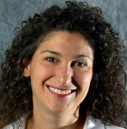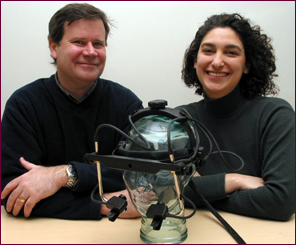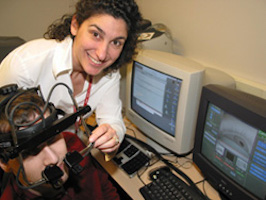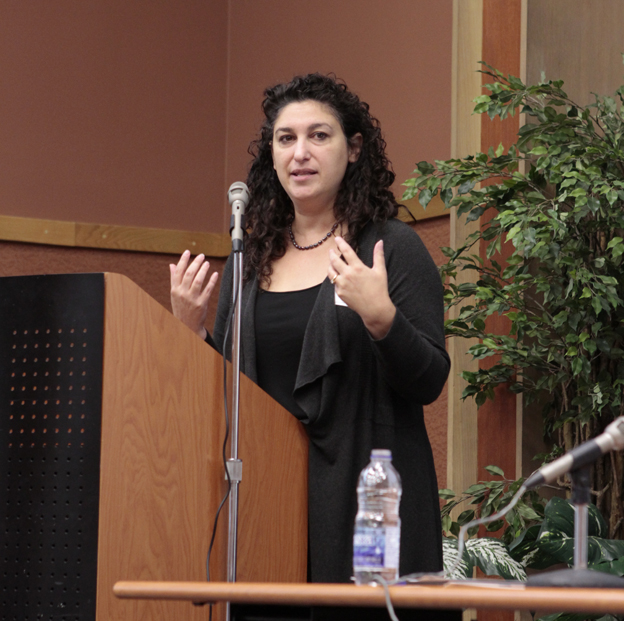
Dr. Allison Sekuler
Associate Vice President and Dean, Graduate Studies, McMaster University
vision, diversity issues, professional development training, and equity, diversity, and inclusivity, knowledge translation, Women in Science and Engineering, Professional Development Training, Perceptual Organization, Pattern Vision, Neurotechnology, Neuroimaging, Neural Plasticity, Motion Perception,
Learning, Internationalization, Interdisiplinarity, Higher Education, Graduate Studies, Face and Object Recognition, Autism, Aging
Media
The Aging Brain - Interview with Prof. Allison Sekuler
Professor Allison Sekuler at McMaster University studies how the brain reorganizes itself as we get older. READ THE FULL STORY: http://research2reality.com/videos/aging-brain/ DOWNLOAD THE TRANSCRIPT: http://research2reality.com/wp-content/uploads/2015/05/The-Aging-Brain-Interview-with-Prof.-Allison-Sekuler.pdf
The McGurk Effect: An audiovisual illusion
The McGurk Effect Watch the speaker in the following video clip, paying special attention to her mouth. What sounds do you hear her saying? The clip will be repeated. The second time, listen to it with your eyes closed. Now what do you hear? The sounds in both clips are the same, but what you hear depends on whether you see the speaker moving her mouth or not. This is an example of the McGurk effect, first described by McGurk and McDonald in 1976 ("Hearing lips and seeing voices." Nature, 264(5588): 746-748. To prove to yourself that there is no trick, watch the whole video again, but this time close your eyes during the first clip, and keep them open (watching the speaker's mouth) during the second. Enjoy! Video made by Allison Sekuler for #ScienceSunday -- find us on Google+
The Science of Facial Recognition – Interview with Prof. Allison Sekuler
Prof. Allison Sekuler at McMaster University studies facial recognition and why some people better at recognizing faces than others. READ THE WHOLE STORY: http://research2reality.com/videos/facial-recognition/ DOWNLOAD THE TRANSCRIPT: http://research2reality.com/wp-content/uploads/2015/01/The-Science-of-Facial-Recognition-Interview-with-Prof.-Allison-Sekuler.pdf
Three Minute Thesis - Dr. Allison Sekuler
The Amazing, Aging, Changing Brain
Three-Minute-Thesis Tips
Courtesy of Dr. Allison Sekuler, Associate Vice-President and Dean of Graduate Studies.
McMaster's IRIS Performance Cycle 2014 - Allison Sekuler
This video shows part of the Launch of the Performance Cycle on Student Success at McMaster University, led by Dr. Catherine Graham of the Theatre & Film Studies program in McMaster's School of the Arts. Its core purpose is to use creative research techniques to facilitate a public conversation about what success means and what conditions need to exist for students to achieve it. Leading members of the McMaster community shared their stories of success in a public demonstration of the technique on September 30, 2013. Audience members then responded to each of these stories by finishing the sentence: "This is the story of the person who...." This was followed by a demonstration of the image theatre techniques Theatre & Film Studies students will use to turn these images and stories into scenes for next year's production of IRIS, the play seen by over 4,000 students in their first week at McMaster. How would you respond to these stories? Comments are encouraged!
NSERC Presents 2 Minutes with Allison Sekuler
http://www.nserc-crsng.gc.ca/Media-Media/ForMedia-PourMedias/BAE-TAP_eng.asp Presenter: Allison B. Sekuler, Professor, Department of Psychology, Neuroscience and Behaviour, McMaster University Date: Thursday, March 3, 2011 Place: Ottawa, Ontario
Part 2: Use it or lose it: Secrets of a healthy brain -- Dr. Allison Sekuler
The Canadian Longitudinal Study on Aging (CLSA) hosted a CIHR Café Scientifique at McMaster Innovation Park on Jan. 30, 2013. The event -- "Use it or lose it: Secrets of a healthy brain" -- provided the public with an opportunity to interact with experts in the field of aging and participate in a discussion on the topic of brain health. The Café featured a panel of leading Canadian health researchers including Christopher Patterson, Parminder Raina and Allison Sekuler of McMaster University; and Kathy Pichora-Fuller of the University of Toronto Mississauga. Support for this event was provided by the Canadian Institutes of Health Research Institute of Aging.
Extraterrestrial Life: #SciSun Hangout on Air
*Time markings below - click on "show more"* Is there life on other planets? And if so, how can astrobiology help us find it, and what do we expect it to be like? #ScienceSunday Hangout featuring Pamela Gay (CosmoQuest), Chris McKay (NASA Ames), Ralph Pudritz (Director, Origins Institute and Prof. Physics and Astronomy, McMaster U), Jon Stone (aka Doc Roc; co-Director, Origins Institute and Prof. Biology, McMaster U), Alyssa Cobb (McMaster graduate student, Physics and Astronomy, with specialization in Astrobioloty). Moderated by Allison Sekuler (co-curator #ScienceSunday and Prof./Dean Graduate Studies, McMaster U). Skip the first part when we're waiting to start, unless you want to listen to the groovy music 🙂 7:45 Welcome and introductions 9:28 Panelists answer question: Is there life on other planets, and if so, how can we find it? 13:29 Would Europa be the next logical place to look for life? Panelists debate advantages of looking on Europa or to continue looking on Mars. 17:49 The Prime Directive: Have people thought about the ethics of contaminating/disturbing other worlds and other lifeforms? 20:49 What environments can we explore more on Earth to develop the skills we need to explore extraterrestrial environments? Discussion of extremophiles here on Earth, and technology being developed to explore extreme environments. 24:08 Would we expect extraterrestrial life to look like if we do find it (could we have fish people? or just micro-organisms?)? Discussion of the biological markers and signals we are looking for in trying to detect life. 26:35 Is the SETI sort of approach a useful one to find life on other planets? or are there better approaches? Brings in a discussion of the Fermi paradox: If there is intelligent life out there already, why aren't they looking for us? 28:53 How many planets (or moons) might be out there already that would be good places to look? Discussion of the Kepler telescope - looking for exoplanets, and how habitable zones might there be? 31:35 Would detection of gases like those we see on Earth (e.g., oxygen, methane, CO2) be a good marker of which planets are habitable - life on other planets? 33:25 Does evolution necessarily have to follow one path? or even if the starting points are the same, might we end up evolving in different directions? Would we expect all living forms to use oxygen etc. the same way we do? 36:45 Discussion of recent results from Mars, suggesting that it was once teeming with water - pointing towards past habitability. 37:58 What can we do to keep from contaminating our own planet when we're bringing back samples from elsewhere. Suggestion that maybe we are all Martians.... 39:36 If we find evidence of life elsewhere, how do we know the life comes from there and not from us (or somewhere else)? Possibility that one could look at differences in amino acids to gain information, or bases that make up DNA, or even the handedness of the molecules. 43:21 How do we use information from meteorites to get information about extraterrestrial life? 45:00 How common is it that we get struck by meteorites that might give us useful information about extraterrestrial life? Noted that how you collect the samples is key - need to avoid contamination if possible. Discussion of 1996 meteorite, which some researchers suggested gave evidence of life on Mars - noted that the result is unconfirmed and controversial. 47:26 Discussion of the recent Russian meteorite: Is it the kind of meteorite that can tell us anything about extraterrestrial life, or just a "boring" meteorite? Turns out to be boring - only about 4% of all meteorites have the kind of organic material we're looking for. 48:28 What's the role of the media in shaping our views of astrobiology and what we expect to find in terms of extraterrestrial life? 51:13 Is it fair to describe evolution of intelligent life as "hard"? Is it just luck that we ended up with intelligent life here on Earth? 53:11 Update from Chris McKay (NASA) on the Mars missions. Searching for organics is a key part of the mission. 55:19 Are there any missions planned to explore asteroids? Yes, but the mission is not to search for life, but in understanding their dynamics and how to deflect them. More of a resource than a biological issue. 56:54 How likely that we'll make more missions to other places exploring life in the future? Mars is hogging all the attention right now. 58:13 Role of collaboration - across nations and across disciplines. Science as an international activity, and importance of interdisciplinarity/transdisciplinarity in solving the big problems. 1:00:56 Will it be possible in our lifetimes to find extraterrestrial life? Answer: a qualified yes, with a big spoonful of "I hope so!" 1:02:35 Will Mars be the smoking gun indicating life? Also discussion of Enceladus, and discussion of whether life might be underground. 1:04:10 Wrap up and thanks.
Discover Psychology - Dr. Allison Sekuler
"The amazing, changing, aging brain." Fri Oct 14, 2011 Gilmour Hall, McMaster University
Training the brain to sharpen your eyesight
Herald Tribune, June 9, 2015Online
URL: http://health.heraldtribune.com/2015/06/09/training-the-brain-to-sharpen-your-eyesight/
“There’s an idea out there that everything falls apart as we get older, but even older brains are growing new cells,” said Allison B. Sekuler, a professor of psychology, neuroscience and behavior at McMaster University in Ontario, who was not involved in the new study. “You can teach an older brain new tricks.”...
McMaster aims to grow number of indigenous grad students in Canada
The Globe and Mail, July 26, 2015Online
Allison Sekuler, acting vice-president of research and psychology professor at McMaster, was inspired to create the program after hearing about a similar one in the United States. She said when aboriginals do access postsecondary education, it can be in a “roundabout,” or “circuitous,” way...
McMaster breaking barriers for indigenous students
The Hamilton Spectator, July 29, 2015Online
URL: http://www.thespec.com/news-story/5764872-mcmaster-breaking-barriers-for-indigenous-students/
"We wanted to let students know that they are not alone out there, that they're not the only ones that want to be a physicist or a historian … that there is a route they can take to achieve their dreams and their goals," said Allison Sekuler, professor of psychology and acting vice-president of research at McMaster...
McMaster University projects awarded $3.3 million to address auto industry, nuclear safety
EurekAlert, April 18, 2016Online
URL: http://www.eurekalert.org/pub_releases/2016-04/mu-mup041816.php
"We are delighted that McMaster was awarded funding for two CREATE projects", says Allison Sekuler, interim vice-president, research, noting that only 13 projects were awarded across the country.
Faculty jobs are rare, but Canada still needs its PhDs
The Globe and Mail, September 10, 2014Online
Fast-forward back to the present, for Janey’s first day as a graduate student: Her eyes are now filled with dread and uncertainty about her future. Janey loves her field of study, but she knows that the years when a PhD was the ticket to a professorship at a prestigious research institution are as long gone as those joyful days of finger painting and puddle splashing...
Perception of partly occluded objects: A microgenetic analysis.
Published by Journal of Experimental Psychology: General
1992 The sensory information specifying objects is often optically incomplete: Objects occlude parts of themselves and other objects. However, people rarely experience difficulty in perceiving complete 3-dimensional forms. This report describes a paradigm for the objective study of completion effects and their microgenesis.
On the time course of attentional focusing in older adults
Published by Psychological Research
2015 Many sensory and cognitive changes accompany normal ageing, including changes to visual attention. Several studies have investigated age-related changes in the control of attention to specific locations (spatial orienting), but it is unknown whether control over the distribution or breadth of attention (spatial focus) also changes with age. In the present study, we employed a dual-stream attentional blink task and assessed changes to the spatial distribution of attention through the joint consequences of temporal lag and spatial separation on second-target accuracy...
URL: http://link.springer.com/article/10.1007/s00426-013-0528-2
Inversion leads to quantitative, not qualitative, changes in face processing
Published by Current Biology
2004 Humans are remarkably adept at recognizing objects across a wide range of views. A notable exception to this general rule is that turning a face upside down makes it particularly difficult to recognize. This striking effect has prompted speculation that inversion qualitatively changes the way faces are processed. Researchers commonly assume that configural cues strongly influence the recognition of upright, but not inverted, faces.
URL: http://www.sciencedirect.com/science/article/pii/S0960982204000867
Comparing face processing strategies between typically-developed observers and observers with autism using sub-sampled-pixels presentation in response classification technique
Published by Vision Research
2013 In the present study we modified the standard classification image method by subsampling visual stimuli to provide us with a technique capable of examining an individual’s face-processing strategy in detail with fewer trials. Experiment 1 confirmed that one testing session (1450 trials) was sufficient to produce classification images that were qualitatively similar to those obtained previously with 10,000 trials...
URL: http://www.sciencedirect.com/science/article/pii/S0042698913000023
A robust and representative lower bound on object processing speed in humans
Published by European Journal of Neuroscience
2015 How early does the brain decode object categories? Addressing this question is critical to constrain the type of neuronal architecture supporting object categorization. In this context, much effort has been devoted to estimating face processing speed. With onsets estimated from 50 to 150 ms, the timing of the first face-sensitive responses in humans remains controversial. This controversy is due partially to the susceptibility of dynamic brain measurements to filtering distortions and analysis issues...
URL: http://onlinelibrary.wiley.com/doi/10.1111/ejn.13100/full
Biography
Dr. Allison Sekuler completed her BA, double majoring in Mathematics and Psychology at Pomona College, 1986; and her PhD in Psychology at the University of California, Berkeley, 1990. She was the first Canada Research Chair in Cognitive Neuroscience (2001-2011), and is a Professor, Psychology, Neuroscience & Behaviour at McMaster University. Her current research is funded by NSERC and CIHR, and focuses on vision science, aging, cognitive neuroscience, neural plasticity, learning, face perception, and neurotechnology.
Sekuler has conducted foundational, applied, and clinical research (including research in schizophrenia and autism). She is also an expert in broader areas of higher education, including interdisciplinary, internationalization, professional development training, and equity, inclusivity, and diversity (EID). She has won numerous national and international awards for research, teaching, and leadership. She has over a decade of experience in University-level administration, serving as McMaster’s first Associate Vice-President (Research), as Associate Vice-President and Dean of Graduate Studies, and twice as the interim Vice-President (Research).
Among her many accomplishments, Sekuler spearheaded McMaster's unique Indigenous Undergraduate Summer Research Scholar Program; supported interdisciplinary academic and research programs, including creation of the McMaster Indigenous Research Institute; and led development of MyGradSkills.ca, a free online professional skills training program for graduate students. She currently is leading development of @mentorsWISE, a virtual mentoring program for women in science and engineering. She also cofounded FoVea (Females of Visions et al.) to support women, BIPOC individuals, and others from under-represented groups in neuroscience and health research. Sekuler is committed to knowledge translation, serving as President of the Royal Canadian Institute for the advancement of science; creating video columns for Discovery Channel; developing public outreach programs, such as Science in the City; popularizing international programs like Café Scientifique and the 3 Minute Thesis in Canada; and co-founding the successful #ScienceSunday platform.
Sekuler has served on and chaired provincial, federal, and international grant review panels and boards related to her research and to education. She also served on the Board of Governors for Hillfield Strathallan College; the Governing Board for the Ontario Council of Universities (co-Chair, Academic Colleagues); and NSERC's Committee on Discovery Research (Chair, Fellowships & Scholarships). Currently, Sekuler co-Championing the Ontario Hospital Association Research & Innovation Committee Anti-Racism taskforce.




